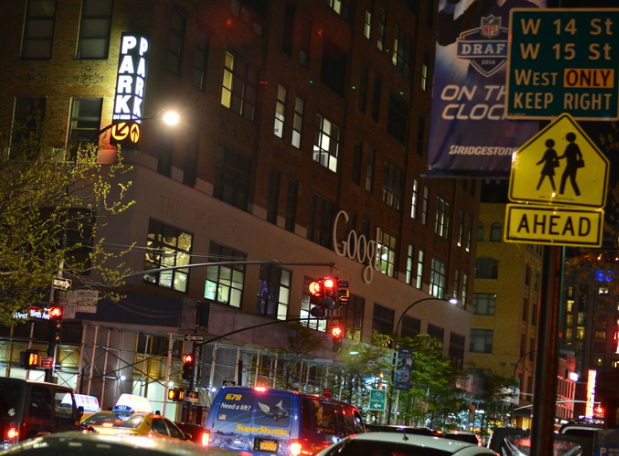 NYC held parade in 1969 for Apollo 11 astronauts, just a few miles from where Google offices are now located. You can Google it! NYC held parade in 1969 for Apollo 11 astronauts, just a few miles from where Google offices are now located. You can Google it! Growing up in Brooklyn in July 1969, I remember the days when our family gathered around the single black-and-white television to watch the landing on the moon. In this case, it was probably downstairs with my grandparents, because my parents were on their way to The City (aka, Manhattan) for the birth of my youngest brother. That was a pretty exciting year for my family and for the Big Apple. One of my older brother's Bar Mitzvah was on the weekend the Jets won their one and only Super Bowl, against the Baltimore Colts, led by Joe Namath. The Mets would follow in October with their first World Series win, versus the Baltimore Orioles, with a pitching staff that included Tom Seaver and Nolan Ryan. Flash forward to 2014. You can get a ton of information about the moon landing and future space exploration on the internet. The web also is a treasure chest for sports statistics enthusiasts. Google works wonders for researching both. Most households now have two or more color televisions, and in many cases smartphones and tablets allow viewers to access programming on their mobile devices as well. This all leads to the question about how older seniors are adapting to the new technological choices. According to the Pew Research Center, seniors have tended to embrace the technology up until around age 75, then usage tails off due to health and other factors. Interestingly, tablets and e-readers are the devices of choice among seniors — perhaps because the screens are more reader-friendly and larger than on smartphones. Here are some noteworthy items from the Pew study:
Interestingly, when Apple last week announced new upcoming features for its operating systems, the ability to answer iPhone calls on a Mac or an iPad was mentioned. It will be interesting to see if this increased user-friendliness will resonate with seniors in new ways.
0 Comments
4/15/2013 0 Comments Smartphones + Tablets >PC's At home or in the air, consumers prefer mobile devices. People like to have access to information while on the move. This becomes apparent when you consider the latest data from Gartner. The more convenient the information is, the better. While sales of PC's are very substantial, they are declining overall, whereas sales of ultrabooks (ultra-thin notebooks), smartphones, and especially tablets continue to grow. In fact, tablet sales are increasing at an incredible rate. Gartner reports that in 2012, over 340 million PC's shipped, versus 116 million tablets. Jump ahead to 2017 and Gartner projects that PC shipments will have dropped to about 272 million, while tablet sales will have soared to about 468 million units. Undoubtedly, there are many implications to this change. What started out as a trickle of tablet users will continue to be the fastest-growing device over the next handful of years. People will expect information in a clean, crisp format on their mobile devices. Working within mobile-based operating systems such as Android and iOS may very well cut into the lead enjoyed for years by the PC-based Windows operating system. Add the introduction of lower-cost mini-tablets such as the iPad Mini and these tablets should continue to grow strongly for the foreseeable future.  Following up the Black Friday note below, the results of Cyber Monday are in and retailers would appear to be quite pleased with the results. According to real-time data collected for the Cyber Monday Report 2012: IBM Digital Analytics Benchmark, online sales skyrocketed 30.3% over the same day in 2011. Some 18% of consumers used a mobile device to view a retailer's website, and mobile sales represented about 13% of all sales. While these numbers in and of themselves might not seem high, both figures are up very significantly over 2011. At 11:25 a.m. (ET) on Cyber Monday, sales reached their peak for the day, but there were strong sales as well after commuting hours. According to IBM, consumers used a "multiscreen" shopping technique, simultaneously finding the best bargains in store, online, and/or on a mobile device. As with Black Friday, iOS devices (iPhone and iPad) led the way for mobile shoppers. The message here would appear to be that any consumer-facing company - whether in retail, financial services, manufacturing, or some other area - should focus on giving the customers what they want in the format they prefer. Paying attention to consumer preferences appears to pay off with increased sales. With many more consumers looking to purchase smartphones and tablets for the foreseeable future, it is important for businesses to take note of this trend. 11/26/2012 0 Comments Not a Cyber Monday Sale HAPPY THANKSGIVING!! If you check your Inbox today, it probably seems that every other e-mail is from a retailer advertising its Cyber Monday sale items. This followed last week's frenzy for Black Friday. There was even a new promotion added this year - Small Business Saturday. If all of these events help to get our economy back on track, that should be a good thing, although it shouldn't be at the cost of near-riots as people line up to get into stores in the middle of the night. Why do we even have Cyber Monday? The answer to that probably lies in the ways most people are now connected. Although there has been a decline in personal computer usage, mobile devices - particularly smartphones and tablets - continue to reach new heights. You can shop in the comfort of your own home at any time of the day or night. You can shop while commuting on a train (if you have a decent signal). You don't have to deal with traffic and hazardous weather conditions. It is probably safer to securely transmit your credit card information than to have someone standing behind you in a crowded store. The impact of Cyber Monday should become apparent in the next day or two as retailers report on their sales results. Just looking at Black Friday, as well as the stores that opened on Thanksgiving Day itself, we see the tremendous impact mobile shopping is having already. According to Black Friday Report 2012: IBM Digital Analytics Benchmark, online sales on Thanksgiving Day were up 17.4% over 2011, while Black Friday sales were up 20.7%. Use of a mobile device to view a retailer's website jumped from 14.3% in 2011 to 24% in 2012. Mobile sales increased from 9.8% to 16%. The iPad was the preferred mobile device for online shopping (10%), followed by the iPhone (8.7%) and Android (5.5%). For those using tablets, the iPad accounted for nearly 90% of online shopping traffic. Without a doubt, iPads (including the new iPad Mini), iPhones, Kindle Fires, and Nooks, among others, will be popular gifts this holiday season. It would seem highly probable that these trends will continue to gain momentum for the foreseeable future. |
Blog Author - Ken FelsherWith over 25 years of writing, editing, and research experience. I enjoy sharing with my readers my love of working with content on a variety of subjects. CategoriesAll 9-11 Airline Apollo 11 Apple Baseball Black Friday Boston Cable Cambridge Ceo Cooperstown Cyber Monday Cyber-Monday Delta Derek Football Freedom Tower Hall Of Fame Harvard Hawaiian HBO Hulu Hurricane Sandy Ipad IPhone IWatch Jeter Marissa Mayer Megatrend MIT Mobile Netflix New-jersey One World Trade Center Personal Computer Qantas Schlep Factor September 11 Smartphone Social Media Tablet Twin Towers United World Trade Center Yahoo Yankees Archives
January 2016
|

 RSS Feed
RSS Feed